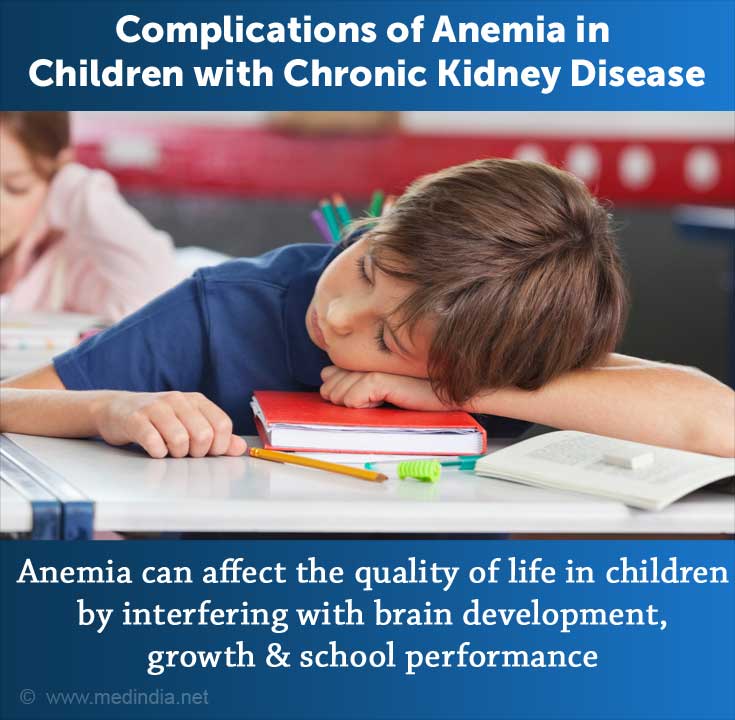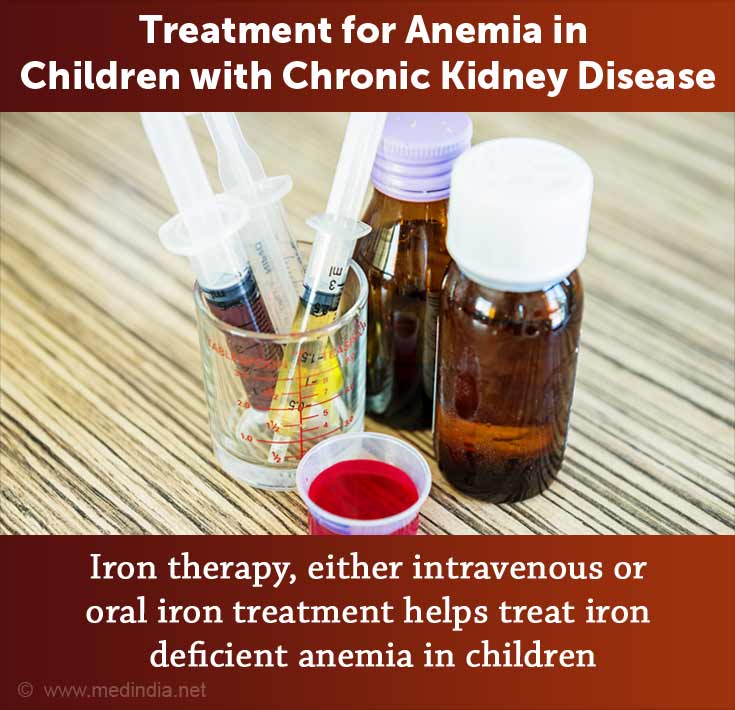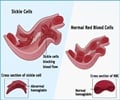- Anemia in children with chronic kidney disease; Meredith et al; Nature Reviews Nephrology 7 35-641 (November 2011)
Chronic Kidney Disease in Children with Anemia
Anemia commonly affects children with chronic kidney disease, especially those in the later stages of the disease.
Chronic kidney disease is associated with anemia in people of all ages. A recent article published in Nature Reviews Nephrology discussed the risk factors, causes, complications and treatment of anemia in children with chronic kidney disease. Some of the important points of the review are summarized below:
Statistics in North America confirm the high prevalence of anemia in children with kidney disease.
Anemia is found in -
- 73% of children with stage 3 chronic kidney disease.
- 87% of children with stage 4.
- >93% of children with stage 5 disease.
Thus, the risk for developing anemia increases as the kidney function worsens. Anemia also results in an increased risk of hospitalization in children with kidney disease.
Other factors that increase the risk for developing anemia in kidney disease are:
- Treatment of high blood pressure with drugs especially those belonging to the group of ACE inhibitors.
- Race: African-American children were found to be more prone to anemia as compared to white Americans.
What are the Causes of Anemia in Children with Chronic Kidney Disease?
Decreased erythropoietin secretion is one of the main reasons for the development of anemia in chronic kidney disease.
Anemia in chronic kidney disease occurs due to multiple reasons, some of which are:
- Deficiency of erythropoietin: Erythropoietin is a hormone secreted by the kidneys that stimulates the production of red blood cells by the bone marrow. Kidney disease results in decreased secretion of erythropoietin and a fall in hemoglobin level.
- Iron deficiency: Iron deficiency may occur in chronic kidney disease due to nutritional deficiency, poor absorption of iron from the digestive tract or blood loss due to frequent blood testing or hemodialysis.
- Other nutritional deficiencies: Deficiencies of other nutrients required for production of red blood cells like vitamin B12, folate, carnitine and vitamin C in chronic kidney disease could also contribute to anemia.
- Chronic inflammation: Chronic inflammation associated with chronic kidney diseases results in decreased iron availability to the bone marrow and inhibition of maturation of red blood cells in the bone marrow. Chronic kidney disease also results in increase in levels of hepcidin, a protein produced by the liver. Hepcidin decreases absorption of iron from the intestines and prevents release of stored iron in the body.
- Uremia and Hyperparathyroidism: Accumulation of urea as seen in chronic kidney disease can reduce survival of red blood cells and result in their increased breakdown. Hyperparathyroidism associated with kidney disease could also contribute to anemia.
Complications of Anemia in Children with Chronic Kidney Disease
Anemia can affect the day-to-day life of a child with chronic kidney disease.
In children, anemia can result in the following complications:
- Anemia can cause heart related problems like left ventricular hypertrophy and death. Anemia has been associated with increased deaths and increased risk for hospitalization.
- Anemia could also worsen chronic kidney disease. One possible mechanism is, anemia results in reduced blood supply to kidneys, which can promote inflammation.
- Anemia can affect the quality of life in children by interfering with brain development and exercise capacity. It can also affect growth, schoolwork and other activities.

How Do You Treat Anemia in Children with Chronic Kidney Disease?
Replacement of the hormone erythropoietin and administration of iron can help treat anemia in children with chronic kidney disease.
Treatment of anemia in chronic kidney disease includes the following:
- Recombinant human erythropoietin: Recombinant human erythropoietin like epoetin alpha and epoetin beta administered as an injection, help replace the erythropoietin deficiency and improve anemia.
Children sometimes require higher doses than adults; the dosage should be calculated based on the hemoglobin deficit rather than body weight. Darbepoetin alfa, which requires less frequent dosing as compared to recombinant human erythropoietin, may be preferred. It is administered via injection either into the vein or under the skin. Some children may not respond adequately to erythropoietin. This could be due to chronic inflammation, nutritional deficiency, inadequate dialysis, chronic blood loss, associated hyperparathyroidism, and antibodies to erythropoietin.
- Iron therapy: Iron deficiency should be treated with intravenous iron. Iron treatment should also be administered with erythropoietin to ensure that enough iron is available for producing new red blood cells. Oral iron treatment in the form of tablets and syrups is not always effective due to reduced absorption from the digestive tract and lack of compliance on the part of the patient. Injection of iron through the vein should be done with caution to avoid iron overload.

Anemia in chronic kidney disease can be controlled by regularly monitoring hemoglobin levels and treating it as early as possible.









